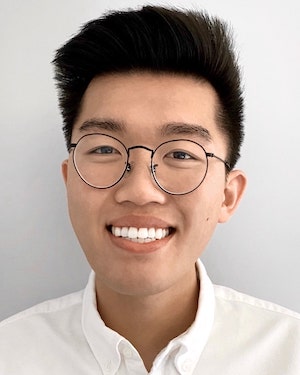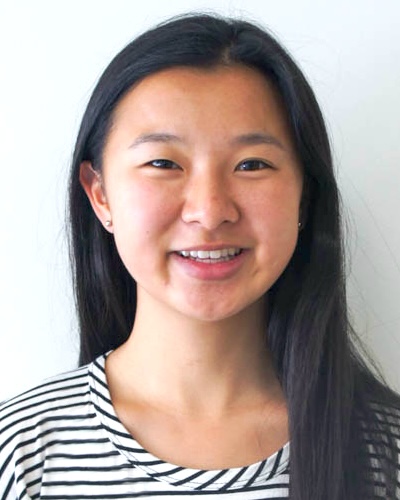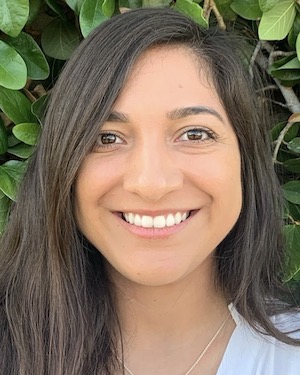Student Blog
Classes

New Occupation, Who This? ⟩
August 18, 2020, by Calvin
Classes Videos What are OS/OT?
The bittersweet summer semester is over! This was my first full semester online and honestly after I hit the “submit” button on my last final exam, I was so relieved and just felt so much freer. Thankfully, we all get one week off to destress before getting back on the grind for the fall.
Something I really wanted to do during the break was tie-dye, and I know what you’re thinking: “that’s so random . . . what does that have to do with anything?” Well, in the OT 534: Health Promotion and Wellness course, Dr. Laura Cox and Dr. Kelcie Kadowaki (both on the Faculty Practice Team) gave us a class day to practice self-care and mindfulness by offering various “Wellness Workshops”. I joined the “Tie-Dye” group because I had never done it before and it seemed really fun! It was so nice to step away from lectures to loosen up, and it reminded me that sometimes I just need to breathe and be in the present. I echo the sentiments of Bethany, Lamoni and Savi’s blog posts about remembering to be good to ourselves, to do what we can, and that it’s okay to give ourselves the time and space we need. I hope that this video can serve as a reminder to practice self-care and also just give you a good laugh! Stick around until the end of the vlog for a very special clip! (Spoiler Alert: Liz makes a colorful guest appearance!)
⋯

Be Prepared for Grad School ⟩
August 12, 2020, by Bethany
Classes Life Hacks
As part of the Bachelor’s-to-Master’s program, my entrance into the Master’s program was unique in that it was also my senior year of undergrad. It was a strange transition, as I was trying to get used to being a Master’s student while holding on to my friends and senior year activities. I struggled with being simultaneously at the top of the school “hierarchy” and the new kid. However, I learned a lot during this past year, and am hoping that if anyone starting this Master’s student life transition resonates with my experience, you can find a new tidbit of information to make the transition easier.
Make New Friends
I struggled with figuring out how to spend my time with people. I wanted to spend every last minute that I could with friends from undergrad, as I knew it was not likely we would live this close to each other again. We had to make the most of our proximity. And yet, it was hard to feel connected to people that I was in new classes with when I was not as open to conversations. It took me a while to realize that these students were going to be with me in the field, and they were people I could learn from and rely on. All this to say: (1) Take the time to have conversations. Whether it be in class (during designated discussion time such as breakout rooms, of course) or not, you can learn about a person even through the course material. One entire class discussed the Therapeutic Use of Self, so we discovered a lot about our own and each other’s personalities. (2) Take the time out of class to hang out. I did not do this one very well, but maybe once a month, whatever you can swing out of your free time, log on to an event. Go meet new people. Start up conversations with people outside of your cohort and classes. Many people would open conversation by asking about the Bachelor’s-to-Master’s program, so I had to learn to use it as a conversation starter, to ask about their own undergraduate experience. We’re all OTs, so we’re all here because we love talking to and helping people.
Another strange factor is our new professors. We meet different OT faculty during these next two years, all with different experiences and expertise. Each student is also paired with a faculty mentor according to their interests. Take advantage of their knowledge base; reach out to them with questions. (3) Use office hours. If you may be unsure of what area of OT you want to go into in the future, as I am, use each practice immersion to further understand your fit for each area. Have conversations with the professors, who are experienced members of their field. It is only during this time that you will have the excuse of class material to start conversations. Even if you can’t use that excuse, faculty are always happy to talk about what they are passionate about. They are also very understanding and can help with any difficulties into the transition to grad school and classes.
Bring a Snack
Three-hour classes feel longer than I care to admit. And although we do get stretch breaks, (4) have food ready! It’s helpful for staying engaged. Be sure that the snack is something you can eat relatively neatly, as you may want to type a quick note on your computer without having to wipe your fingers of Cheeto dust. (Or like some of my creative friends, you can eat Cheetos with chopsticks.) We also have a nice lunch break in between classes. If you’re on HSC, you can go pick up a burrito from the surrounding food trucks, or eat your own homemade lunch. Lunch time is still a great chance for a stretch break, and one good quesadilla, whether off the stove or from the cafeteria across the way, can be a turning point after a tiring class.
Any Time is Usable Time
This is a lesson that I learned riding the shuttle to and from campus, but it’s applicable in more ways than one. It can feel like a long commute to the Health Science Campus from the University Park Campus or from wherever you call home. However, you can make the most of the ride. I was able to journal on the shuttle if I was awake enough, or catch up on another thirty minutes of sleep (which was a more common occurrence). Start on school readings, review slides for the upcoming quiz, or re-read the Harry Potter series. Download a movie on your phone. If you’re driving, take the time to listen to new music on the radio, or get pumped up for the day with some of your favorites. Listen to a new podcast. (5) Make the most of seemingly unusable minutes, even if it is just to relax and take a break. Some of my favorite shuttle rides would be when I ran into a friend on the shuttle, often a friend from UPC that I had not seen in a while, and we would use the shuttle ride to catch up on life. Unusable minutes may take a different form while we’re taking online classes, but that goes into my next point . . .
Balancing Act
All of life is about balance, between work and school and friends and commitments. Adjusting to Master’s classes requires an adjustment of that balance. After completing a Blackboard quiz, make time to go grab dinner with a friend. My first semester, I personally decided to make time to stay in the Trojan Marching Band, blasting summer hits on Cromwell Field. Music was part of my life, and going to practice and playing piccolo was a bright spot in my day. (6) Make time for the things that keep you going. I had never used the calendar app on my phone so much as when I transitioned to grad school. My friend helped me color-code my schedule into different categories, a system I thought I would never use but ended up loving. Seeing the red of a band event or the green of an Intervarsity Christian Fellowship event was a bright spot in my day, and my calendar ensured that I did not miss things that were important to me. For me, this adjustment to online classes changes the balancing act. Now, it means calling a friend during my lunch break or taking time after class to play an instrument.
Lean on Your Support System
Every day, I’d come home to my apartment-mates, and I’d get to hear about how aerospace or linguistics classes were going and share about my own day. They and my other friends made time to let me ramble about adjusting to life and gave me time to just be myself. When I felt stressed, they would drive me out to get mandatory ice cream. When I needed a day out, we’d go to drive-in movie nights and have picnics. When I needed advice, they’d sit me down and tell me what I needed to hear, even when it was hard. You can find support in many forms, whether it’s finding tips on Calvin’s Survival Guide and reaching out to the student ambassadors, or having good, long conversations with friends. (7) Lean on your support system. These days, I go downstairs to do a workout with my mom and rant if I need to. But whether with friends or family, you are not alone in this.
Lastly, (8) be kind to yourself. It is a transition, and everyone will adjust differently. Don’t be harsh on yourself if the transition takes time. Make the most of these opportunities that we have: learn a lot, have fun, and Fight On!
⋯

Student-Work-Life Balance ⟩
July 30, 2020, by Lamoni
Classes Getting Involved Life Hacks
We often hear about the importance of a work-life balance or a student-life and social-life balance. However, we do not talk much about the balance of being a student, being an employee, and being social or engaging in self-care. When I discuss work, I do not mean students that have student jobs (like me). Though that is also something to consider. Being a student with a student job still requires balancing but student jobs understand that your life as a student comes first. These jobs often allow time for studying while at work. They also tend to be more flexible to a student’s schedule. My boss constantly emphasizes self-care and she consistently remind my coworkers and I to adjust our schedules as needed. Shout-out to her; we love you Kim. The flexibility that I see in my job as a student worker typically does not ring true for employment outside of the university. Most employers expect their employees to be committed to a certain schedule and to give their full attention to their work while they are on the clock.
Recently, a few first-year students told me that they would like to become more involved but feel too busy with summer courses at the moment. Some even asked for advice on what they should do because they assumed that their lack of involvement would reflect poorly on them. I want to assure everyone that you are not obligated to join any organizations. Please do not overwhelm yourselves. In fact, many people do not become involved until their spring semester. The goal of the student-organization fair and any emails that you are receiving from organizations are to make you aware of what is out there. Think of them as saying “here are your options, if you so choose” and not “pick me!” If your plate is full or you simply are not interested right now, that is completely fine.
I brought up these concerns with my friend, Daphne, and they spoke about their own experience during their first semester of the master’s program (which we all know is very fast paced). But more than student life which includes student organizations and groups, they told me about how difficult it was to also have a job. After being in class from 8:30AM to 4:30PM, Daphne would go to work. Then after work, they would tend to homework and studying. They said “during summer, it was easy to be overwhelmed with everything going on. There were so many extracurriculars that I was I was interested in, but I did not have time between class and work. I hardly had time for sleep.” Daphne also mentioned feeling alone and unaware of any other students balancing jobs on top of their studies.
Now, with campus being closed due to COVID-19 and many student jobs being unavailable, I believe some students have picked up work outside of school. Additionally, I know that some students have children or are responsible for financially contributing to their household – maybe more so because of the pandemic. I have heard from some of my peers that their families are requiring more financial assistance from them. It is difficult to balance student-life, work-life, and life-life. Add in COVID-19 and it can become an even greater struggle.
So, what do you do?
If you can say “no,” say it.
I know that some responsibilities are non-negotiable. However, not everything requires your time. When someone asks something of you, the answer “no” is a viable option. For the people that have a hard time saying no, there are several ways to say it ~nicely~
Special shoutout to @BRIARAMs on twitter for creating a thread. Here are some of her suggestions.
“I appreciate you for considering me, but this is not for me at the moment.”
“I am unsure, may we revisit this another time?”
“Thank you so much for thinking of me, but I have committed to something else.”
“Unfortunately, now is not a good time.”
I used to have difficulty telling people no but there are only so many hours in a day. Plus, I cannot get the job done effectively If I am tired or have to tend to 100 things at once. Learning how to say no to some things allows you to say yes to what is important to you.
Reduce your involvement
Sometimes we get excited and push ourselves to become more involved than necessary. Similar to saying no, reducing your involvement helps to take some things off of your plate. As mentioned, many of you want to become more involved but you are concerned about the commitment. If there is something that you absolutely want to be a part of, become a member. But remember—That does not mean you have to be a board member. You do not have to show up to every meeting. You do not have to take on additional roles. Do what you can and nothing more.
When assistance is offered, take it
During these uncertain times, there are programs, loans, and grants to alleviate stress (e.g., CARES Act Federal Grant, housing/rent assistance, business loans). Take advantage of those modes of assistance. Their sole purpose is to offer help so do not feel bad. Apply for what you need. If you need them all, apply for them all.
Ask for help
When help is offered, we are more likely to take it than to directly ask for it. A lot of people struggle with asking for help. But honestly, there is no harm in it. The worst thing that can happen is being told no. Do you foresee yourself needing an extension on your paper? Ask for it. Ask your boss if you can do readings at work when things are moving slow. Many people are more understanding than we think. If you explain your situation, they may be willing to help you out.
I wish life was as simple as saying – just be a student and fully commit to that. But in reality, there are bills, there are student loans, there are car payments. There are responsibilities outside of being a student. However, there are a few things that you can do to make it all feel a bit more manageable. I hope these tips offer some relief.
⋯

Summer in Lifestyle Redesign ⟩
July 23, 2020, by Liz
Classes
The summer semester is almost coming to an end and I thought it would be cool to share with you all about the Lifestyle Redesign elective course I’ve been taking for the past 9 weeks! As you may already know, Lifestyle Redesign was developed here at USC Chan. Pretty awesome, right? If you don’t know much about Lifestyle Redesign, it is an intervention approach that OTs can use with clients to help them manage chronic conditions by taking a closer look at their habits and routines in order to work with them towards building healthier lifestyles.
The coolest part about taking this elective is that we’ve had the chance to practice having our own client! So, one of our peers is assigned to be our client and in return we get to work on some goals ourselves by being another student’s client. We meet with our client once a week for 30 minutes (this is the target time). So far we’ve met for 6 sessions and now that summer is almost over we have two more to go! Here’s a little bit of what I’ve learned:
1. How to incorporate therapeutic techniques I’ve learned in class
We’ve gone over SO much this summer! I’ve been working on using principles of motivational interviewing, integrating coaching strategies, and using communication techniques during these sessions.
2. Paying close attention to your body language and facial expressions is so important
Our body language and facial expressions can say so much. Since we are doing this remotely, it’s been pretty cool to see myself on Zoom and pay close attention to what my client sees when they’re speaking to me. Of course, I wish I were seeing my client in person, but Zoom has been pretty helpful for getting started! We definitely want to make sure our clients feel like they are in a safe space and being mindful of the way we react to what they share is important for doing that.
3. How to pace myself
As I mentioned before, the sessions are meant to be 30 minutes long. It’s so easy to get caught up talking about one thing, and although it would be amazing to have all the time in the world to talk to our clients that isn’t the reality. So far I’ve made some progress—my last session was 33 minutes long!
4. How to document
Documentation is so important! As Dr. Rebecca Cunningham has mentioned this summer, it is a love letter to your future self! Documentation is how OTs communicate patient progress, it supports how we are reimbursed, and shows why our clients are benefiting from our services. During the process I’ve practiced using appropriate language, writing long-term goals, and writing short-term goals for my client. We also receive feedback that we can then implement into the following week’s documentation. It’s great to be able to practice and make mistakes and learn from those mistakes in a safe space!
5. How to switch gears
Sometimes what we had in mind for our session doesn’t go as planned. So, it’s important to be able to switch gears a little bit and tailor the session to best meet the needs of our clients. It won’t always go our way and that is completely okay!
Although I am looking forward to that week off before fall semester starts, I will definitely miss this course! Our program offers a variety of elective options for students to take and I am so happy I chose to take this one this summer. I’ve learned a lot of useful tools and have developed skills that will definitely be useful when out in practice!
⋯

Try Everything: Selecting Electives ⟩
July 8, 2020, by Bethany
Classes
Due to the pandemic and recommendations for social distancing, our summer classes have put us ahead of schedule in terms of coursework. So when I went to go check my email the other day, I found a message about picking electives for the Fall semester. I was both overwhelmed and nervous, but thankfully, the email also mentioned a Zoom information meeting to help us learn more about our options and what Fall is going to look like.
The electives have been something I have been looking forward to in this program for a long time. A lot of the Master’s coursework follows different practice immersions and thread courses throughout a specific course sequence designed to let us get a taste of OT in all of its forms. After those first semesters, we get to choose from a variety of electives for us to consider, either to specialize or to broaden our scope of knowledge further.
I had come into this program very interested in hand therapy, since it was one of my first experiences with OT. I also had the chance to volunteer under the same hand therapist later during my undergraduate career. For next semester, there were two courses related to hand therapy, OT 573: Hand Rehabilitation and OT 562: Advance Practice in Hand Therapy and Physical Agent Modalities. Hand therapy had always been a consideration, but now, after going through two of the Division’s immersions, I am considering other possibilities as well.
I was excited to be in Adult Physical Rehabilitation as my first immersion. I wanted to see more hand therapy, but then even just starting the immersion, I was able to experience the ways in which Rehab applies to so much more: transfers after hip replacements, creating memory devices, or even relearning the use of a limb after a stroke. At my fieldwork site, I was lucky to be able to experience interdisciplinary work, looking at how occupational therapists work with experts in other fields. In observing an interdisciplinary group for a wheelchair consultation, I began to understand the unique perspective that OT has to offer to complement the views of a physician, a physical therapist, and nurse.
I had been wary of the Mental Health immersion. Being a type A person, I had expected to be most drawn to the Adult Physical Rehab process of having certain activities tied to certain physical outcomes. I was at first almost scared by the seeming vastness and uncertainty of Mental Health. Instead, I found myself intrigued by the power of conversation and by the power of activity. I ran groups at my fieldwork site, engaging people not just through words but also in actions, through activities like a music group, origami, and activities engaging the senses. I fell in love with occupational therapy all over again, amazed by the power of doing, how activity does not just impact the physical, but mental aspects as well. I had expected the immersions to help me narrow down which field I wanted to be in; however, I feel like my choices are only expanding.
And now, I am very much looking forward to the Pediatrics immersion. I expect myself to come into the immersion with a more open mind. Though, I am worried that I will come away from the immersion with my mind open to even more possibilities than I am already considering.
The electives open to us for the Fall were numerous and varied, covering topics from Lifestyle Redesign to ergonomics to dysphagia and swallowing. I realized that I do not have to take courses only focusing on hand therapy if I do not want to. I’ve decided this Fall that instead of taking two hand courses, I will instead take a few others to diversify my course load. In addition to OT 573, I have requested clearance for OT 563: Occupational Therapy in Primary Healthcare Environments and OT 566: Healthcare Communication with Spanish-Speaking Clients. I’m excited to see how these different courses will prepare me to be a better clinician in the future!
⋯





